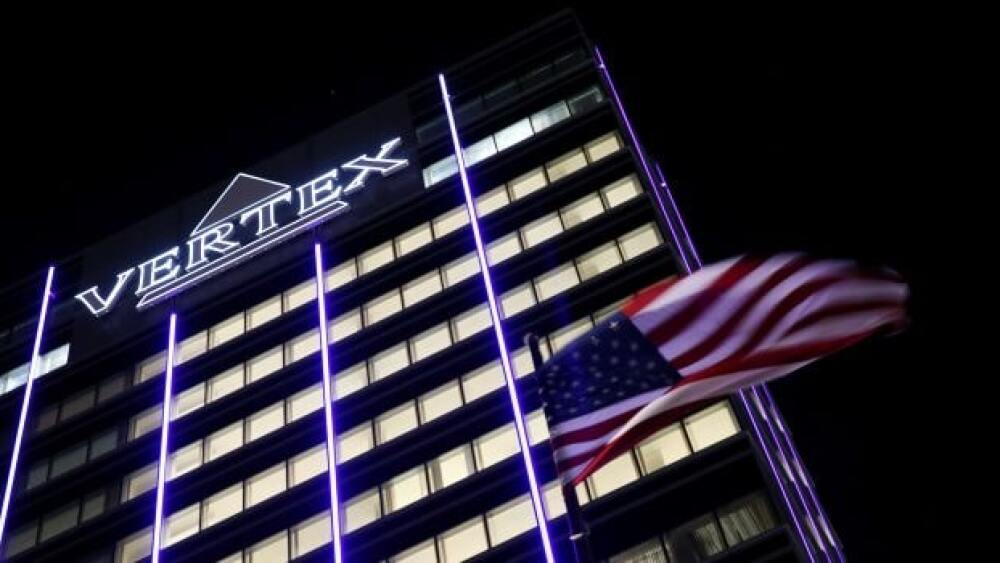Vertex Pharmaceuticals announced positive Day 90 data from the first patient in its Phase I/II study of VX-880 in type 1 diabetes.
Craig F. Walker/The Boston Globe via Getty Images
Vertex Pharmaceuticals announced positive Day 90 data from the first patient in its Phase I/II study of VX-880 in type 1 diabetes (T1D). The therapy is a stem cell-derived, fully differentiated pancreatic islet cell replacement therapy.
T1D is an autoimmune disease, where the immune system attacks the islet cells in the pancreas, which is where insulin is produced. This leads to loss of insulin production and problems with blood sugar control.
In the study, the patient received a single infusion of VX-880 at half the target dose along with immunosuppressive therapy. The patient showed successful engraftment and demonstrated immediate and robust improvements in several measurements, including increases in fasting and stimulated C-peptide, improvements in glycemic control, including HbA1c. It also resulted in less need for medical insulin. The therapy appeared well tolerated.
“These results from the first patient treated with VX-880 are unprecedented,” said Bastiano Sanna, Executive Vice President and Chief of Cell and Genetic Therapies at Vertex. “What makes these results truly remarkable is that they were achieved with treatment at half the target dose. “While still early, these results support the continued progression of our VX-880 clinical studies, as well as future studies using our encapsulated islet cells, which hold the potential to be used without the need for immunosuppression.”
The patient was diagnosed 40 years ago with T1D and was insulin dependent. In the year before treatment, the patient had five severe, potentially life-threatening cases of low blood sugar. Before receiving VX-880, the patient was taking 34 units per day of insulin and had undetectable fasting and stimulated C-peptide levels. This is a signal that the patient was not producing their own insulin.
The patient was dosed with half a target dose of the therapeutic via a hepatic portal vein infusion in parallel with a standard immunosuppressive agent. Then, during the 90 days, fasting C-peptide, HbA1c and 7-day average daily insulin dose was measured. Fasting C-peptide was registered soon after treatment and increased rapidly to Day 90. The HbA1c and daily insulin dose also decreased over time.
Using a Mixed Meal Tolerance Test (MMTT) with quantification of C-peptide levels, pancreatic islet cell function was evaluated at baseline and at Day 90. MMTT is a direct marker for insulin production. The fasting and stimulated C-peptide levels could not be detected at baseline, meaning there was no endogenous insulin production. At Day 90, fast C-peptide was 280 pmol/L after receiving the treatment, indicating restored basal insulin production. After MMTT stimulation, it peaked at 560 pmol/L, indicating that the therapy restored glucose-responsive insulin production.
At Day 90, HbA1c improved from 8.6% at baseline to 7.2%. Daily insulin dose dropped from 34 units per day before treatment to an average of 2.9 units per day over a 7-day period at the Day 90 check. This is a 91% decrease in daily exogenous insulin use.
“As a surgeon who has worked in the field of islet cell transplantation for decades, this approach, which obviates the need for an organ donor, could be a game changer,” said James Markmann, Professor of Surgery and Chief of the Division of Transplant Surgery at Massachusetts General Hospital. “We are excited to progress this unique and potentially transformative medicine through clinical trials and to patients.”
Based on these results, the company plans to continue the program. There are multiple sites in the U.S. and the Clinical Trial Application has been given the greenlight in Canada. Vertex also indicates it is progressing the IND-enabling studies for its encapsulated islet cell program. This would possibly remove the need for immunosuppression. It expects to file the IND for it in 2022.
This is very good news for the company, which is a leader in cystic fibrosis, but has had problems expanding into other indications. In June, the company reported that its Phase II proof-of-concept trial of VX-864 for alpha-1 antitrypsin deficiency (AATD) met the primary endpoint. However, the drug wasn’t good enough and was “unlikely to translate into substantial clinical benefit.” So the company abandoned the program and is shifting toward advancing other novel small molecule correctors. It has also had similar results for two experimental pain drugs and another for AATD.
Analysts and investors have been patient with the company, mainly because of its $7 billion CF franchise, but it may be wearing thin.
Paul Matteis, an analyst with Stifel, noted, “They’re a victim of their own success. A lot of big companies in biotech get to a point where they build an incredible company on one drug and the investment question becomes, can you do it again?”
Although the type 1 diabetes announcement today is very early and only one patient, it has enormous potential. But there’s a lot of work to be done over a very long period to determine if the results are as broadly successful in more than one patient and how long the benefits last.





